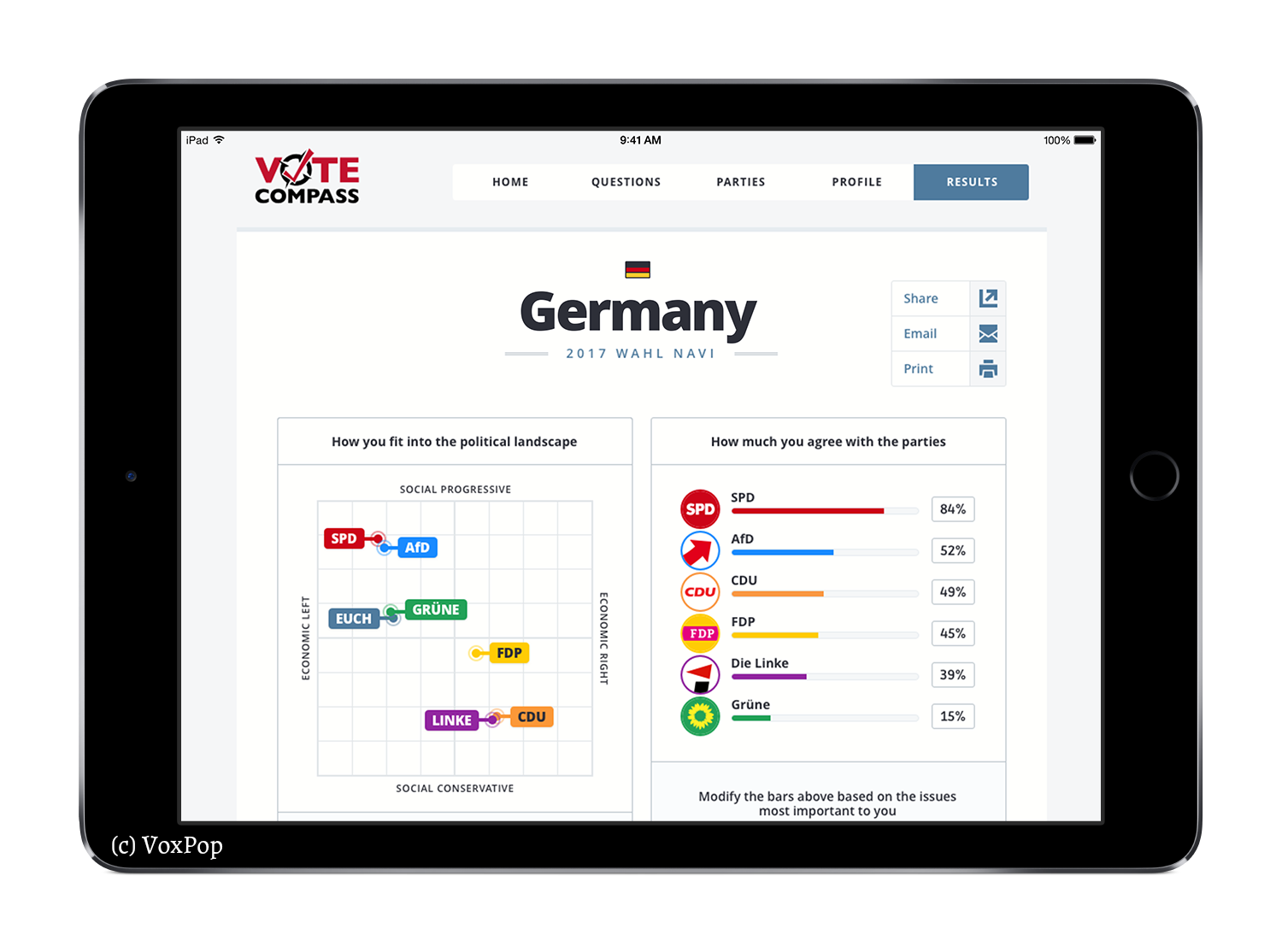
Reflecting voters voices back to government
Toronto-based social enterprise Vox Pop Labs has developed a civic engagement application called Vote Compass in order to help German voters evaluate their options before making an important decision and casting their ballot on September 24th during Germany’s “Bundestagswahl”. The application was first launched for the 2011 Canadian Federal Elections in partnership with the media organization CBC. Since then many more versions have followed including this year’s German edition Wahl-Navi, in cooperation with German media company RTL. On the basis of users answering 30 questions about key political policy issues, their alignment with the political parties contesting the election will be calculated. We had the chance to speak to the innovator of Vote Compass, Clifton van der Linden, on the German edition of Vote Compass (German title Wahl-Navi) and the importance of informed decision making.
Q.: How does Vote Compasswork?
CL: … Vote Compass is a civic engagement application that is known as voting advice application in Germany. The most prominent one in Germany right now is the Wahl-o-mat. These applications typically serve a democratic function. They are leveraging digital technology to try and inform voters about policy positions of the political parties and how well those political parties will reflect the political interests or preferences of individual users. … Party manifestos and party rhetoric have become quite obtuse at times, and it’s difficult for the average voter to bind all the information that is available to them about what the parties stand for. And in order to give them a personalized perspective we created this application. …
Q.: What are the differences compared to the Wahl-o-mat?
CL: There are both methodological and design differences. … The interface is much more modern: it’s a mobile sort of response and design application, it is meant for the mobile phone but you can also use it on desktops. It has social media integrations: you can share your results with your friends; you can see where your friends stack up. Methodologically, we offer some really nice data visualizations that allow you to see how you compare with the parties, in an overall sense. It gives the user a more intuitive and easy to understand sense of in the grand scheme of things where do they fall. … We have a much more fine grained response scale. … The gradient matters in terms of giving you a more fine-grained sense of your positioning of the parties. Therefore, I would say we are also more accurate.
Q.: Can the results of Vote Compass be taken as voting advice?
CL: The term voting advice application comes out of the European discourse and I have always publicly and in my academic work rejected that label. I think it is a bad term. But it is entrenched and it is hard to get out of, so I never refer to Vote Compass as a voting advice application. …
Q.: What is your term for the Vote Compass?
CL: I call it a civic engagement application. It’s an educational tool helping users explore public policy. Now, public policy is only a part of your vote atlas. When you go cast your ballot you will consider the public positions of the parties, you will also consider the historical track record, you consider how your family has traditionally voted and what that means to you, you consider the party leaders and how much you trust them to be the next German chancellor. We just focus on the public policy part, so there is a broader calculus that goes into vote choice and we are giving you one component. We hope that what that means is that voters are more informed and feeling more confident about their decisions, whatever those decisions may be. … If we can foster a more informed electorate about public policy issues, that holds the parties that will govern more accountable, makes their platform more transparent and does empower voters on the electorate.

Q: Is that the ultimate goal of all vote compasses?
CL: Yes. It is two-folds. It is about democratic participation. We know that voter turnout in western democracies is low, especially with young people. This is also the case in Germany. We are trying to create tools that enfranchise new generations of voters in particular but all voters as well. Bringing people into politics and elections so they can exercise their democratic rights in a more informed and empowered way, is our primary goal. But also being able to hold politicians to account for what they say and do and the promises they make is a part of creating a more robust and healthy democratic society.
Q.: How did you go about setting up the German Vote Compass also in comparison to the other already issued Vote Compasses?
CL: … Because we have run it around the world we have a lot of experience but there are also contextual aspects that we have to consider within the German context. There has been a lot of knowledge transfer back and forth between the Canadian team and the German media partner and German academics. … This will be to my knowledge the first time that a major news organization has directly partnered with this kind of application. … I know that millions have used the Wahl-o-mat (Ed. Wahl-o-mat is created by bpb, the Federal Agency for Civic Education) and so I am hoping with a tool that is maybe more appealing, combined with a prominent media partner, that we will get millions of Germans to use the tool. And then that results in the third sort of benefit which is collecting a massive data set. … We have the in-house methodological and statistical teams; … they can weigh the data even though it is self-selected to make it representative of the population. We can actually release inferences about the German population and their views on their key public policies through RTL and academic public publications that further empower German citizens because we are reflecting their voices back to those who are governing. So if you win an election it shouldn’t necessarily be read as sort of „carte blanche” acquiescence to your public policy platform …. You should take a moment, pause and listen to what the electorate actually thought about your public policy positions. … We can look at millions of people on our data set. We want to reflect their voices back to the government and we would like the government to take stock of where the public is situated … and reflect seriously on the campaign promises as they convert those into public policy positions.
Q.: Did you come across any specific difficulties compared to previous Vote Compasses while working on the German Vote Compass?
CL: Perhaps the obvious one is the language barrier. … We do have members on our team who are Europeans and some are German-speaking but not as many and on the same level of fluency as we have in English and French. … Other than that you have a different electoral system than most places we have operated, so there are some considerations about the electoral system.… But overall if anything the differences were quite positive. The people we have worked together with in Germany are extremely professional, extremely efficient and have a very intelligent thoughtful approach to this project. … It really comes from a place of a true sense of duty to promote the health of German democracy and to not view this as gimmicky at all but as a true contribution to the democratic discourse.
This article was originally posted here.
Find more information about Germany’s upcoming election on this website.